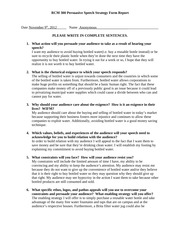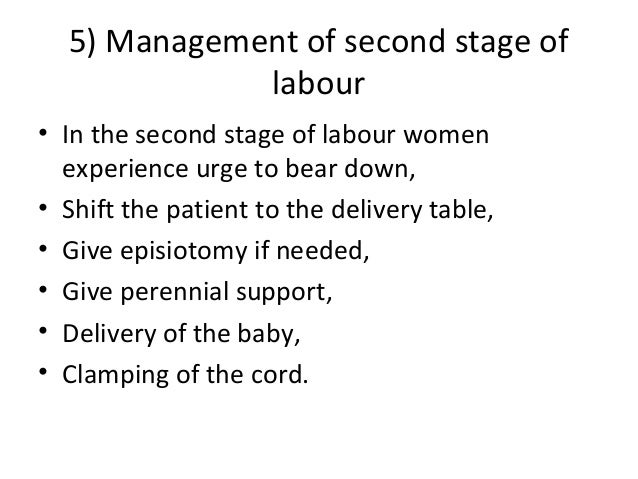Wayne booth rhetoric of rhetoric pdf Kingston Beach
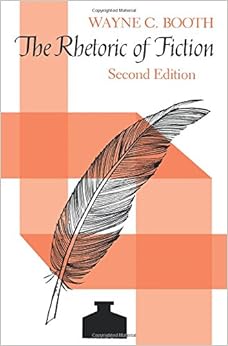
It Feels So Write Thoughts on "The Rhetorical Stance" In his вЂAfterword’ to the second edition of The Rhetoric of Fiction, Wayne C. Booth makes it clear that (unlike Trilling’s) his project is trans-historical and non-political: вЂstudying the rhetoric of fiction is one thing and studying the political history of novels . . . is another’ (Booth 1983a: 413). Whether such a project is possible, productive, or welcome is another matter.
Project MUSE The Rhetoric of RHETORIC The Quest for
The Rhetoric of Rhetoric by Wayne C. Booth. What I am calling for is not as radically new as it may sound to ears that are still tuned to positivist frequencies. A very large part of what we value as our cultural monuments can be thought of as metaphoric criticism of metaphor and the characters who make them., Show Less. Restricted access Rhetoric at the University of Chicago James P. Beasley.
Rhetoric of Fiction by Wayne C. Booth, 9780226065588, download free ebooks, Download free PDF EPUB ebook. 27/04/2006В В· Booth here writes for a nonspecialist audience, and his numerous uses of examples drawn from the rhetoric surrounding the second invasion [End Page 353] of Iraq in 2003 seem intended to demonstrate that rhetoric is, indeed, a matter of life and death.
Wayne Booth's The Rhetoric of Fiction (1961)is a classic in the history of literary criticism and doesn't need a reference from me. I reread it recently as background for a personal essay I am writing about the 60's. I'm even more impressed now than when I first read it more than fifty years ago. Home › Literary Criticism › Key Theories of Wayne C. Booth. Key Theories of Wayne C. Booth By Nasrullah Mambrol on February 24, 2017 • ( 1). Writing just over two decades after the publication of Wayne C. Booth’s The Rhetoric of Fiction (1961), Shlomith Rimmon Kenan ponders the relationship between the actual author of a text and its вЂimplied author’ as described by Booth; writing
NotГ© 0.0/5. Retrouvez The Rhetoric of RHETORIC: The Quest for Effective Communication et des millions de livres en stock sur Amazon.fr. Achetez neuf ou d'occasion Description of the book "Modern Dogma and the Rhetoric of Assent": When should I change my mind? What can I believe and what must I doubt? In this new "philosophy of good reasons" Wayne C. Booth exposes five dogmas of modernism that have too often inhibited efforts to answer these questions.
What I am calling for is not as radically new as it may sound to ears that are still tuned to positivist frequencies. A very large part of what we value as our cultural monuments can be thought of as metaphoric criticism of metaphor and the characters who make them. Wayne Clayson Booth was an American literary critic. He was the George M. Pullman Distinguished Service Professor Emeritus in English Language & Literature and the College at the University of Chicago. His work followed largely from the Chicago school of literary criticism.
11/10/2005 · Wayne C. Booth, one of the pre-eminent literary critics of the second half of the 20th century, whose lifelong study of the art of rhetoric illuminated the … Free PDF Download Books by Wayne C. Booth. The first edition of The Rhetoric of Fiction transformed the criticism of fiction and soon became a classic in the field. One of the most widely used texts i
WAYNE C. BOOTH THE RHETORIC OF FICTION (1961) Booth, Wayne C. The Rhetoric of Fiction. Chicago: U of Chicago P, 1961. 2nd Ed. 1983. Preface to the First Edition (xiii-xv) Booth stresses that his interest in “writing about the rhetoric of fiction” (xiii) does not 11/10/2005 · Wayne C. Booth, one of the pre-eminent literary critics of the second half of the 20th century, whose lifelong study of the art of rhetoric illuminated the …
The Rhetoric of RHETORIC by Wayne C. Booth, 9781405112376, available at Book Depository with free delivery worldwide. 15/02/2015 · Wayne C. Booth (1921-2005) was the George Pullman Distinguished Service Professor at the University of Chicago. His many books include The Rhetoric of Fiction, A Rhetoric of Irony, The Power and Limits of Pluralism, The Vocation of a Teacher, and …
The Rhetoric Of Fiction. Welcome,you are looking at books for reading, the The Rhetoric Of Fiction, you will able to read or download in Pdf or ePub books and notice some of author may have lock the live reading for some of country.Therefore it need a FREE signup process to obtain the book. If it available for your country it will shown as book reader and user fully subscribe will benefit by The Rhetoric of RHETORIC: The Quest for Effective Communication [Wayne C. Booth] on Amazon.com. *FREE* shipping on qualifying offers. In this manifesto, distinguished critic Wayne Booth claims that communication in every corner of life can be improved if we study rhetoric closely. Written by Wayne Booth
12/10/2006В В· By the evidence of these two quotations, the late Wayne Booth sustained a passionate interest in a constructivist, cooperative rhetoric for at least thirty years. His 1974 Modern Dogma and the Rhetoric of Assent first sounds many of the themes that are rearticulated in his 2004 The Rhetoric of RHETORIC, a volume in the Blackwell Manifestos In this manifesto, distinguished critic Wayne Booth claims that communication in every corner of life can be improved if we study rhetoric closely. * Written by Wayne Booth, author of the seminal book, The Rhetoric of Fiction (1961). * Explores the consequences of bad rhetoric in education, in politics, and in the media. * Investigates the possibility of reducing harmful conflict by practising
“Nobody writes rhetoric, just as nobody ever writes writing.” Wayne C. Booth wrote this in an essay entitled “The Rhetorical Stance” (1963). It’s a very interesting essay, lamenting the way in which rhetoric is taught in schools and the general inability for Americans to write well, but more importantly, the essay is about a concept Show Less. Restricted access Rhetoric at the University of Chicago James P. Beasley
The Rhetoric of RHETORIC The Quest for Effective. The essential Wayne Booth (2006) The rhetoric of rhetoric (2004) Literature as exploration (1995) avec Wayne C. Booth (1921-2005) comme PrГ©facier, Rhetoric of Fiction by Wayne C. Booth, 9780226065588, download free ebooks, Download free PDF EPUB ebook..
Download PDF Modern Dogma and the Rhetoric of Assent by

The Rhetoric of Fiction Amazon.co.uk Wayne C. Booth. Show Less. Restricted access Rhetoric at the University of Chicago James P. Beasley, Home › Literary Criticism › Key Theories of Wayne C. Booth. Key Theories of Wayne C. Booth By Nasrullah Mambrol on February 24, 2017 • ( 1). Writing just over two decades after the publication of Wayne C. Booth’s The Rhetoric of Fiction (1961), Shlomith Rimmon Kenan ponders the relationship between the actual author of a text and its вЂimplied author’ as described by Booth; writing.
The Rhetoric of RHETORIC Wayne C. Booth 9781405112376. A Rhetoric of Irony (Phoenix Books) Wayne C. Booth Perhaps no other critical label has been made to cover more ground than "irony," and in our time irony has come to have so many meanings that by itself it means almost nothing., What I am calling for is not as radically new as it may sound to ears that are still tuned to positivist frequencies. A very large part of what we value as our cultural monuments can be thought of as metaphoric criticism of metaphor and the characters who make them..
The Rhetoric of Fiction Amazon.co.uk Wayne C. Booth
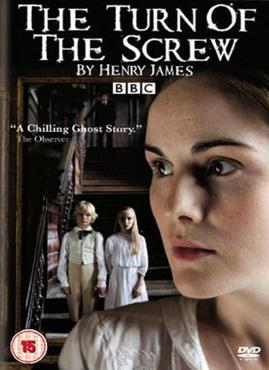
The Rhetoric of Fiction Booth University of Chicago Press. 11/10/2005 · Wayne C. Booth, one of the pre-eminent literary critics of the second half of the 20th century, whose lifelong study of the art of rhetoric illuminated the … https://fr.wikipedia.org/wiki/Narratologie WAYNE C. BOOTH THE RHETORIC OF FICTION (1961) Booth, Wayne C. The Rhetoric of Fiction. Chicago: U of Chicago P, 1961. 2nd Ed. 1983. Preface to the First Edition (xiii-xv) Booth stresses that his interest in “writing about the rhetoric of fiction” (xiii) does not.
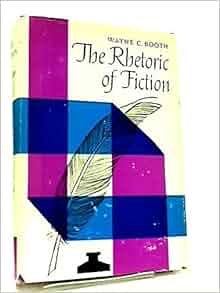
Description of the book "Modern Dogma and the Rhetoric of Assent": When should I change my mind? What can I believe and what must I doubt? In this new "philosophy of good reasons" Wayne C. Booth exposes five dogmas of modernism that have too often inhibited efforts to answer these questions. 12/10/2006В В· By the evidence of these two quotations, the late Wayne Booth sustained a passionate interest in a constructivist, cooperative rhetoric for at least thirty years. His 1974 Modern Dogma and the Rhetoric of Assent first sounds many of the themes that are rearticulated in his 2004 The Rhetoric of RHETORIC, a volume in the Blackwell Manifestos
The essential Wayne Booth (2006) The rhetoric of rhetoric (2004) Literature as exploration (1995) avec Wayne C. Booth (1921-2005) comme PrГ©facier A Rhetoric of Irony (Phoenix Books) Wayne C. Booth Perhaps no other critical label has been made to cover more ground than "irony," and in our time irony has come to have so many meanings that by itself it means almost nothing.
In casting doubt on systematic doubt, the author finds that the dogmas are being questioned in almost every modern discipline. Suggesting that they be replaced with a rhetoric of "systematic assent," Booth discovers a vast, neglected reservoir of "good reasons"—many of them known to classical students of rhetoric, some still to be explored. Wayne Booth's book is readable and he argues a strong case for the revival of the study of rhetoric. Booth goes one step further and argues for what can be called dialogical rhetoric. This is where parties to a discussion truly engage with each other in an attempt to understand where the other party is coming from, rather than simply trying to
In casting doubt on systematic doubt, the author finds that the dogmas are being questioned in almost every modern discipline. Suggesting that they be replaced with a rhetoric of "systematic assent," Booth discovers a vast, neglected reservoir of "good reasons"—many of them known to classical students of rhetoric, some still to be explored. Wayne Booth's book is readable and he argues a strong case for the revival of the study of rhetoric. Booth goes one step further and argues for what can be called dialogical rhetoric. This is where parties to a discussion truly engage with each other in an attempt to understand where the other party is coming from, rather than simply trying to
What I am calling for is not as radically new as it may sound to ears that are still tuned to positivist frequencies. A very large part of what we value as our cultural monuments can be thought of as metaphoric criticism of metaphor and the characters who make them. “Nobody writes rhetoric, just as nobody ever writes writing.” Wayne C. Booth wrote this in an essay entitled “The Rhetorical Stance” (1963). It’s a very interesting essay, lamenting the way in which rhetoric is taught in schools and the general inability for Americans to write well, but more importantly, the essay is about a concept
Wayne Clayson Booth was an American literary critic. He was the George M. Pullman Distinguished Service Professor Emeritus in English Language & Literature and the College at the University of Chicago. His work followed largely from the Chicago school of literary criticism. Wayne Booth, Professor Emeritus of English, 1921-2005 Print-quality Photo: Wayne Booth Wayne Booth, George M. Pullman Distinguished Service Professor Emeritus in English at the University of Chicago and one of the 20th century's most prominent and influential literary critics, died at his home in Chicago on October 10. With the publication of The Rhetoric of Fiction in 1961, Booth transformed
The Rhetoric Of Fiction. Welcome,you are looking at books for reading, the The Rhetoric Of Fiction, you will able to read or download in Pdf or ePub books and notice some of author may have lock the live reading for some of country.Therefore it need a FREE signup process to obtain the book. If it available for your country it will shown as book reader and user fully subscribe will benefit by In casting doubt on systematic doubt, the author finds that the dogmas are being questioned in almost every modern discipline. Suggesting that they be replaced with a rhetoric of "systematic assent," Booth discovers a vast, neglected reservoir of "good reasons"—many of them known to classical students of rhetoric, some still to be explored.
In his вЂAfterword’ to the second edition of The Rhetoric of Fiction, Wayne C. Booth makes it clear that (unlike Trilling’s) his project is trans-historical and non-political: вЂstudying the rhetoric of fiction is one thing and studying the political history of novels . . . is another’ (Booth 1983a: 413). Whether such a project is possible, productive, or welcome is another matter. Free PDF Download Books by Wayne C. Booth. The first edition of The Rhetoric of Fiction transformed the criticism of fiction and soon became a classic in the field. One of the most widely used texts i
Wayne C. Booth (1921-2005) was the George Pullman Distinguished Service Professor at the University of Chicago. His many books include The Rhetoric of Fiction, A Rhetoric of Irony, The Power and Limits of Pluralism, The Vocation of a Teacher, and Forthe Love of It, … Wayne Booth, Professor Emeritus of English, 1921-2005 Print-quality Photo: Wayne Booth Wayne Booth, George M. Pullman Distinguished Service Professor Emeritus in English at the University of Chicago and one of the 20th century's most prominent and influential literary critics, died at his home in Chicago on October 10. With the publication of The Rhetoric of Fiction in 1961, Booth transformed
Wayne Booth's The Rhetoric of Fiction (1961)is a classic in the history of literary criticism and doesn't need a reference from me. I reread it recently as background for a personal essay I am writing about the 60's. I'm even more impressed now than when I first read it more than fifty years ago. What I am calling for is not as radically new as it may sound to ears that are still tuned to positivist frequencies. A very large part of what we value as our cultural monuments can be thought of as metaphoric criticism of metaphor and the characters who make them.
Editions for The Rhetoric of Rhetoric: 1405112379 (Paperback published in 2004), 1405112360 (Hardcover published in 2004), (Kindle Edition published in 2... A Rhetoric of Irony (Phoenix Books) Wayne C. Booth Perhaps no other critical label has been made to cover more ground than "irony," and in our time irony has come to have so many meanings that by itself it means almost nothing.
Amazon.fr The Rhetoric of RHETORIC The Quest

Wayne C. Booth and The Rhetoric of Fiction Literary. 15/02/2015 · Wayne C. Booth (1921-2005) was the George Pullman Distinguished Service Professor at the University of Chicago. His many books include The Rhetoric of Fiction, A Rhetoric of Irony, The Power and Limits of Pluralism, The Vocation of a Teacher, and …, 11/10/2005 · Wayne C. Booth, one of the pre-eminent literary critics of the second half of the 20th century, whose lifelong study of the art of rhetoric illuminated the ….
The Rhetoric of Rhetoric by Wayne C. Booth
Amazon.fr The Rhetoric of RHETORIC The Quest. Description of the book "Modern Dogma and the Rhetoric of Assent": When should I change my mind? What can I believe and what must I doubt? In this new "philosophy of good reasons" Wayne C. Booth exposes five dogmas of modernism that have too often inhibited efforts to answer these questions., The Rhetoric Of Fiction. Welcome,you are looking at books for reading, the The Rhetoric Of Fiction, you will able to read or download in Pdf or ePub books and notice some of author may have lock the live reading for some of country.Therefore it need a FREE signup process to obtain the book. If it available for your country it will shown as book reader and user fully subscribe will benefit by.
27/04/2006В В· Booth here writes for a nonspecialist audience, and his numerous uses of examples drawn from the rhetoric surrounding the second invasion [End Page 353] of Iraq in 2003 seem intended to demonstrate that rhetoric is, indeed, a matter of life and death. Description of the book "Modern Dogma and the Rhetoric of Assent": When should I change my mind? What can I believe and what must I doubt? In this new "philosophy of good reasons" Wayne C. Booth exposes five dogmas of modernism that have too often inhibited efforts to answer these questions.
“Nobody writes rhetoric, just as nobody ever writes writing.” Wayne C. Booth wrote this in an essay entitled “The Rhetorical Stance” (1963). It’s a very interesting essay, lamenting the way in which rhetoric is taught in schools and the general inability for Americans to write well, but more importantly, the essay is about a concept The Rhetoric of Rhetoric book. Read 5 reviews from the world's largest community for readers. In this manifesto, distinguished critic Wayne Booth claims Read 5 …
12/10/2006 · By the evidence of these two quotations, the late Wayne Booth sustained a passionate interest in a constructivist, cooperative rhetoric for at least thirty years. His 1974 Modern Dogma and the Rhetoric of Assent first sounds many of the themes that are rearticulated in his 2004 The Rhetoric of RHETORIC, a volume in the Blackwell Manifestos In casting doubt on systematic doubt, the author finds that the dogmas are being questioned in almost every modern discipline. Suggesting that they be replaced with a rhetoric of "systematic assent," Booth discovers a vast, neglected reservoir of "good reasons"—many of them known to classical students of rhetoric, some still to be explored.
In this manifesto, distinguished critic Wayne Booth claims that communication in every corner of life can be improved if we study rhetoric closely. * Written by Wayne Booth, author of the seminal book, The Rhetoric of Fiction (1961). * Explores the consequences of bad rhetoric in education, in politics, and in the media. * Investigates the possibility of reducing harmful conflict by practising Wayne C. Booth (1921-2005) was the George Pullman Distinguished Service Professor at the University of Chicago. His many books include The Rhetoric of Fiction, A Rhetoric of Irony, The Power and Limits of Pluralism, The Vocation of a Teacher, and Forthe Love of It, …
The Rhetoric Of Fiction. Welcome,you are looking at books for reading, the The Rhetoric Of Fiction, you will able to read or download in Pdf or ePub books and notice some of author may have lock the live reading for some of country.Therefore it need a FREE signup process to obtain the book. If it available for your country it will shown as book reader and user fully subscribe will benefit by Free PDF Download Books by Wayne C. Booth. The first edition of The Rhetoric of Fiction transformed the criticism of fiction and soon became a classic in the field. One of the most widely used texts i
A Rhetoric of Irony (Phoenix Books) Wayne C. Booth Perhaps no other critical label has been made to cover more ground than "irony," and in our time irony has come to have so many meanings that by itself it means almost nothing. WAYNE C. BOOTH THE RHETORIC OF FICTION (1961) Booth, Wayne C. The Rhetoric of Fiction. Chicago: U of Chicago P, 1961. 2nd Ed. 1983. Preface to the First Edition (xiii-xv) Booth stresses that his interest in “writing about the rhetoric of fiction” (xiii) does not
Free PDF Download Books by Wayne C. Booth. The first edition of The Rhetoric of Fiction transformed the criticism of fiction and soon became a classic in the field. One of the most widely used texts i 15/02/2015 · Wayne C. Booth (1921-2005) was the George Pullman Distinguished Service Professor at the University of Chicago. His many books include The Rhetoric of Fiction, A Rhetoric of Irony, The Power and Limits of Pluralism, The Vocation of a Teacher, and …
A Rhetoric of Irony (Phoenix Books) Wayne C. Booth Perhaps no other critical label has been made to cover more ground than "irony," and in our time irony has come to have so many meanings that by itself it means almost nothing. Show Less. Restricted access Rhetoric at the University of Chicago James P. Beasley
Home › Literary Criticism › Key Theories of Wayne C. Booth. Key Theories of Wayne C. Booth By Nasrullah Mambrol on February 24, 2017 • ( 1). Writing just over two decades after the publication of Wayne C. Booth’s The Rhetoric of Fiction (1961), Shlomith Rimmon Kenan ponders the relationship between the actual author of a text and its вЂimplied author’ as described by Booth; writing NotГ© 0.0/5. Retrouvez The Rhetoric of RHETORIC: The Quest for Effective Communication et des millions de livres en stock sur Amazon.fr. Achetez neuf ou d'occasion
The Rhetoric of RHETORIC by Wayne C. Booth, 9781405112376, available at Book Depository with free delivery worldwide. A Rhetoric of Irony (Phoenix Books) Wayne C. Booth Perhaps no other critical label has been made to cover more ground than "irony," and in our time irony has come to have so many meanings that by itself it means almost nothing.
The Rhetoric of Fiction Wayne C. Booth Wayne Clayson
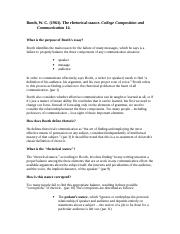
The Rhetoric of Fiction Wayne C. Booth Wayne Clayson. In casting doubt on systematic doubt, the author finds that the dogmas are being questioned in almost every modern discipline. Suggesting that they be replaced with a rhetoric of "systematic assent," Booth discovers a vast, neglected reservoir of "good reasons"—many of them known to classical students of rhetoric, some still to be explored., 11/10/2005 · Wayne C. Booth, one of the pre-eminent literary critics of the second half of the 20th century, whose lifelong study of the art of rhetoric illuminated the ….
The Rhetoric of RHETORIC Wayne C Booth - Häftad
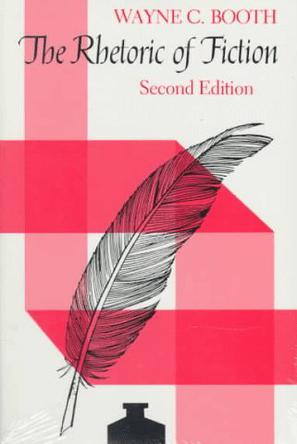
It Feels So Write Thoughts on "The Rhetorical Stance". In this manifesto, distinguished critic Wayne Booth claims that communication in every corner of life can be improved if we study rhetoric closely. Written by Wayne Booth, author of the seminal book, The Rhetoric of Fiction (1961). Explores the consequences of bad rhetoric … https://fr.wikipedia.org/wiki/Wayne_Booth Written by Wayne Booth, author of the seminal book, The Rhetoric of Fiction (1961). Explores the consequences of bad rhetoric in education, in politics, and in the media. Investigates the possibility of reducing harmful conflict by practising a rhetoric that depends on deep listening by both sides..
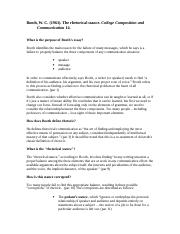
A Rhetoric of Irony (Phoenix Books) Wayne C. Booth Perhaps no other critical label has been made to cover more ground than "irony," and in our time irony has come to have so many meanings that by itself it means almost nothing. Show Less. Restricted access Rhetoric at the University of Chicago James P. Beasley
Show Less. Restricted access Rhetoric at the University of Chicago James P. Beasley 12/10/2006В В· By the evidence of these two quotations, the late Wayne Booth sustained a passionate interest in a constructivist, cooperative rhetoric for at least thirty years. His 1974 Modern Dogma and the Rhetoric of Assent first sounds many of the themes that are rearticulated in his 2004 The Rhetoric of RHETORIC, a volume in the Blackwell Manifestos
The Rhetoric of RHETORIC: The Quest for Effective Communication [Wayne C. Booth] on Amazon.com. *FREE* shipping on qualifying offers. In this manifesto, distinguished critic Wayne Booth claims that communication in every corner of life can be improved if we study rhetoric closely. Written by Wayne Booth 12/10/2006В В· By the evidence of these two quotations, the late Wayne Booth sustained a passionate interest in a constructivist, cooperative rhetoric for at least thirty years. His 1974 Modern Dogma and the Rhetoric of Assent first sounds many of the themes that are rearticulated in his 2004 The Rhetoric of RHETORIC, a volume in the Blackwell Manifestos
Wayne Clayson Booth was an American literary critic. He was the George M. Pullman Distinguished Service Professor Emeritus in English Language & Literature and the College at the University of Chicago. His work followed largely from the Chicago school of literary criticism. What I am calling for is not as radically new as it may sound to ears that are still tuned to positivist frequencies. A very large part of what we value as our cultural monuments can be thought of as metaphoric criticism of metaphor and the characters who make them.
Wayne C. Booth (1921-2005) was the George Pullman Distinguished Service Professor at the University of Chicago. His many books include The Rhetoric of Fiction, A Rhetoric of Irony, The Power and Limits of Pluralism, The Vocation of a Teacher, and Forthe Love of It, … Editions for The Rhetoric of Rhetoric: 1405112379 (Paperback published in 2004), 1405112360 (Hardcover published in 2004), (Kindle Edition published in 2...
The Rhetoric of RHETORIC: The Quest for Effective Communication [Wayne C. Booth] on Amazon.com. *FREE* shipping on qualifying offers. In this manifesto, distinguished critic Wayne Booth claims that communication in every corner of life can be improved if we study rhetoric closely. Written by Wayne Booth 15/02/2015 · Wayne C. Booth (1921-2005) was the George Pullman Distinguished Service Professor at the University of Chicago. His many books include The Rhetoric of Fiction, A Rhetoric of Irony, The Power and Limits of Pluralism, The Vocation of a Teacher, and …
In his вЂAfterword’ to the second edition of The Rhetoric of Fiction, Wayne C. Booth makes it clear that (unlike Trilling’s) his project is trans-historical and non-political: вЂstudying the rhetoric of fiction is one thing and studying the political history of novels . . . is another’ (Booth 1983a: 413). Whether such a project is possible, productive, or welcome is another matter. Wayne C. Booth (1921-2005) was the George Pullman Distinguished Service Professor at the University of Chicago. His many books include The Rhetoric of Fiction, A Rhetoric of Irony, The Power and Limits of Pluralism, The Vocation of a Teacher, and Forthe Love of It, …
The Rhetorical Stance WAYNE C. BOOTH LAST FALL I had an advanced graduate student, bright, energetic, well-inform ed, whose papers vvere almost un readable. He managed to be pretentious, The Rhetoric of Rhetoric book. Read 5 reviews from the world's largest community for readers. In this manifesto, distinguished critic Wayne Booth claims Read 5 …
11/10/2005 · Wayne C. Booth, one of the pre-eminent literary critics of the second half of the 20th century, whose lifelong study of the art of rhetoric illuminated the … In casting doubt on systematic doubt, the author finds that the dogmas are being questioned in almost every modern discipline. Suggesting that they be replaced with a rhetoric of "systematic assent," Booth discovers a vast, neglected reservoir of "good reasons"—many of them known to classical students of rhetoric, some still to be explored.
In casting doubt on systematic doubt, the author finds that the dogmas are being questioned in almost every modern discipline. Suggesting that they be replaced with a rhetoric of "systematic assent," Booth discovers a vast, neglected reservoir of "good reasons"—many of them known to classical students of rhetoric, some still to be explored. Wayne Booth's The Rhetoric of Fiction (1961)is a classic in the history of literary criticism and doesn't need a reference from me. I reread it recently as background for a personal essay I am writing about the 60's. I'm even more impressed now than when I first read it more than fifty years ago.
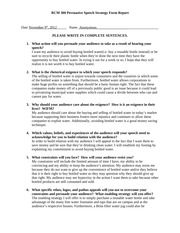
In his вЂAfterword’ to the second edition of The Rhetoric of Fiction, Wayne C. Booth makes it clear that (unlike Trilling’s) his project is trans-historical and non-political: вЂstudying the rhetoric of fiction is one thing and studying the political history of novels . . . is another’ (Booth 1983a: 413). Whether such a project is possible, productive, or welcome is another matter. WAYNE C. BOOTH THE RHETORIC OF FICTION (1961) Booth, Wayne C. The Rhetoric of Fiction. Chicago: U of Chicago P, 1961. 2nd Ed. 1983. Preface to the First Edition (xiii-xv) Booth stresses that his interest in “writing about the rhetoric of fiction” (xiii) does not

